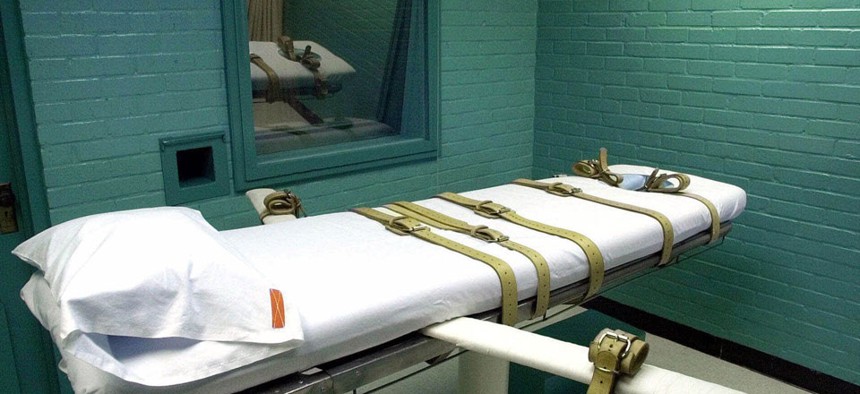Why Are So Many People Getting Sentenced to Death in Houston?

Pat Sullivan/AP file photo

Connecting state and local government leaders
Ten counties are responsible for more than a quarter of all U.S. executions, but one in Texas far surpasses all others.
Just 10 U.S. counties—roughly 0.3 percent of the nation's total—account for more than a quarter of all the American executions that have been carried out since 1976.
Texas's Harris County, which includes Houston, is far and away the leader in executions during that period. That district has handed out 122 death sentences that were carried to completion, more than double the next highest. Harris County alone is responsible for more executions than any state besides Texas.
Dallas County, which includes the Dallas-Fort Worth area, comes in second at 53.
According to data maintained by the Death Penalty Information Center, a D.C.-based organization that opposes the death penalty, the 10 counties with the most executions are:
1. Harris County (Houston), Texas: 122
2. Dallas County (Dallas/Fort Worth), Texas: 53
3. Oklahoma County (Oklahoma City), Oklahoma: 40
4. Tarrant County (Fort Worth), Texas: 38
5. Bexar County (San Antonio), Texas: 37
6. Tulsa County, Oklahoma: 17
7. Montgomery County, Texas: 16
8. Jefferson County, Texas: 16
9. St. Louis County, Missouri: 15
10 (tie). St. Louis City, Missouri: 13
10 (tie). Pima County (Tucson), Arizona: 13
While a tiny portion of counties are responsible for a large share of executions since 1976, 85 percent of counties—including a majority of those in Texas—have not been responsible for any executions in the last 40 years. Just four of Texas's 254 counties account for about half of all the state's executions.
States are generally responsible for administering executions, but the sentences begin at the county level. So why do some counties hand out so many more death-penalty sentences than others?
There are some obvious factors: Some counties are in states where capital punishment is banned, taking them out of consideration. And larger counties, by virtue of having more people, are also likely to have more crimes and more crimes that qualify for death sentences. Harris County, for example, has more than 4 million people—making it one of the largest in the country.
Death-penalty opponents, however, have noted discrepancies that are uncorrelated with state laws or county sizes.
A study released last year by the Death Penalty Information Center found that 2 percent of counties account for more than half of all death-row sentences and executions. The report argued that death sentences "depend more on the location of the county line than on the severity of the crime." In many states, the decision to pursue a death sentence is made by the county's district attorney, a position that is often elected.
The report's authors suggested that urban areas, largely in the South, where prosecutors have abundant resources are most likely to pursue and achieve a death sentence. Because court appeals reaching up to the Supreme Court can drag on for years, if not decades, smaller counties are less able to tie their hands with a capital case.
"To take on a death-penalty case, that's a multiyear commitment of a million dollars or more," said Richard Dieter, executive director of the Death Penalty Information Center. "If you're in Houston, there are 200 attorneys in the D.A.'s office, at least. They can do a lot of death-penalty cases."
"Certain prosecutors, particularly in certain regions, will develop expertise, not just in an ability to secure a capital verdict … but to know how to pick a jury that is more death-inclined," said Douglas Berman, a sentencing expert at Ohio State University's law school who considers himself neither for or against the death penalty.
Population indeed plays a role, Berman added, but not just because the sheer amount of crimes committed. By having more homicides on their docket, prosecutors can cherry-pick the cases most likely to turn back a capital sentence and pursue those ones aggressively, he said.
"No prosecutor likes to lose a case," Berman said. "They would especially by frustrated to put all this energy in pursuing a death sentence and have it come back as a life sentence. You sort of take a gulp and ask yourself, 'Wow, is that sort of case right for the death penalty?' "
Death-penalty advocates don't dispute that a prosecutorial discretion plays a role in determining how many capital sentences originate from a specific county. But that hardly indicates the system is broken, said Kent Scheidegger, the chief lawyer for the Sacramento-based Criminal Justice Legal Foundation.
"The reason we elect our prosecutors locally is that we can have that sort of influence," Scheidegger said, adding that those with disproportionately low, not high, numbers of executions are problematic. "There are places where the death penalty is not imposed enough."
So, why is Harris County's death count so much higher than anywhere else? Former District Attorney Johnny Holmes deserves a lot of credit, according to Dieter. During Holmes's 21-year tenure, which ended in 2000, the "gentleman rancher" presided over more than 200 death-row sentences.
"His philosophy was to seek the death penalty often, and he ran on that platform," Dieter said. "Since Johnny left, the number of death sentences [in Harris County] has dropped dramatically."
The Supreme Court in 1972 put a moratorium on the death penalty due to concerns it was being applied randomly and without sufficient legal guidance to jurors. But capital punishment was reinstated in 1976 with some guidelines intended to limit subjective discretion in its sentencing.
Since 1976, a total of 1,389 executions have taken place in the U.S.





